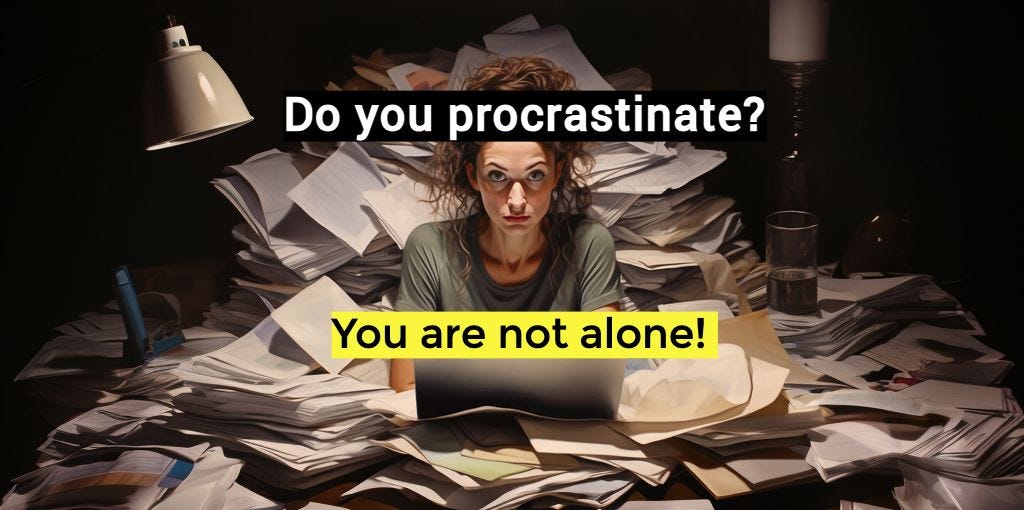Procrastinators, the leaders of tomorrow (no, not really)
Lol no, procrastinators are not the leaders of tomorrow. Constant procrastination will actually harm you. Let's see some famous examples and how to deal with it in real life.
Procrastination is the action (or inaction, lol) of delaying or postponing something, and we have many examples in pop culture (you start thinking about them, I am going to list some in a bit). Procrastination is pretty frequent and instantly gratifying, but if you, my dear reader, want to be a successful project/program manager, you can’t afford to be a procrastinator, not a big one, at least. In this post, I am going to remember some famous procrastinators. I will explain why I procrastinated in the past (and sometimes in the present, I am human, after all), and I will finish with some techniques that help me overcome procrastination. Disclaimer: I am not a psychologist, anthropologist, or sociologist, so this will be based on my personal and professional experience. You have been warned 🙂.
The procrastinators
This will not be an exhaustive list, just some examples that come to mind. Feel free to add more in the comments if you want!
Ok, one of the first examples that come to mind when thinking of procrastination is Scarlett O’Hara in Gone With the Wind.
Yes, Scarlett is a force of nature, a human whirlwind, strong and resilient. She also tends to deal with difficult situations with her famous I’ll think about it tomorrow. Dang, Gone With the Wind ends with Scarlett saying it after Rhett leaves her! If you watch the video above, it won’t escape you that tomorrow brings comfort and hope, so the movie ends on a high note. After all, tomorrow will be another day full of possibilities, so there is no need to deal with shit today. Procrastinating, aka postponing things to tomorrow, brings immediate joy. It is gratifying.
Let’s see now another example of gratifying tomorrow. Probably the most famous song about it:
Same pattern: there’s a complex problem to solve, folks are worried, Annie is sad. No problem! Let’s think about tomorrow, that magical well of hope where all productivity dies!
Open parenthesis - I added a clip from the 1982 version of Annie because I thought it would be the most recognizable. However, integrity, morals, and honor force me to state here that, IMHO, the best version of Annie is the one from 1999. Just take a look at the cast if you don’t believe me! - Close parenthesis.
I am going to share now the final example. This one is from this century, don’t worry 🙂. Here we see the consequences of procrastinating and a hint at how to prevent procrastination. Enter Parks and Recreation and the amazing Ron Swanson, April Ludgate, and Leslie Knope. Ron Swanson has an allergy to meetings, so April schedules them all for March 31st, believing that day doesn’t exist. When the day comes, Ron must figure out how to escape the mess.
Here we see how procrastinating has terrible (or at least very annoying) consequences. We never escape procrastinating. What we don’t do comes back stronger to kick us in the ass. The exciting thing about this video is that Ron deals with the problem by delegating as much as possible. More on this later 🙂.
Why do we procrastinate, anyway?
There are a million articles out there dedicated to procrastination. The one I relate to the most is Why You Procrastinate (It Has Nothing to Do With Self-Control). So, basically, when we procrastinate, it is not (only) a result of laziness or poor time management. Guess what? It is because of challenging emotions and negative moods induced by the task we are trying to accomplish. In a nutshell: we are not lazy. It is just that our brain is regulating emotions such as boredom, anxiety, insecurity, frustration, and self-doubt. The relief experienced in the moment of procrastination reinforces the behavior, leading to a vicious cycle.
The article doesn’t say this, but it is like if our very primitive brain feels danger coming from the undone tasks, then it thinks we are going to die, so it runs away from the danger.
Back to the article now. Procrastination has measurable adverse effects on mental and physical health, including chronic stress, psychological distress, symptoms of depression and anxiety, poor health behaviors, chronic illness, and cardiovascular disease. So, basically, we get instant gratification from running away from danger, but our brain knows the tasks are still there. Even if it is in a dark corner of our brain, the tasks exist, causing mental pain. And we don’t want to be in pain at -or because of- work, do we?
The article suggests practicing self-forgiveness and self-compassion as strategies to manage procrastination, finding alternative rewards, and treating ourselves with kindness and understanding. While I don’t disagree, other strategies have also worked for me.
Procrastinate no more!
This is very personal. What works for me may not work for you. I’ll just share what I do, and you pick (or not) the parts that you find interesting.
The task is not going to kill me
When I procrastinate, it usually is because the task is challenging and scares me, so my brain thinks it will kill me. I have to constantly tell my brain that the task is NOT going to kill me and that the worst that can happen if I royally fuck it up is, like, nothing. Impostor syndrome plays a part here, but I’ll talk about that another day.
I can always Ron Swanson it and delegate
Another reason to procrastinate is actually the opposite: the task is boring and not challenging at all. If you can delegate the task, it may be an opportunity for growth for someone else. Don’t delegate just dumping the task to someone else. Invest time in guiding and coaching, then follow up and provide feedback, and in no time, you won’t have to worry about that task.
Check-lists, prioritization
When I procrastinate, the undone tasks don’t disappear from my head. They are there, lurking, menacing, preventing me from enjoying my free time, my Alias binge-rewatching, and my coffees with friends. Scary tasks (mostly) disappear from my head if I put them somewhere else, like a checklist. I acknowledge everything I have to do and put it on a list. Then I prioritize them. I usually use a very lightweight urgent vs. important matrix that also helps me figure out the stuff I need to work on delegating. Once everything is written down and prioritized, my brain breathes a bit. This list is my dear companion. I am always adding stuff, reprioritizing, and removing items already done. This list is like my backlog for my own stuff. So I treat it like that. I am the product manager of myself if you will.
Iterate!
Now that I have a backlog, guess what? I have daily standups with myself and one-week sprints. This is way less involved than you think, especially if you are familiar with Agile. On Monday morning, I have a mini sprint planning with myself. I plan the tasks that I will do, often blocking time in my calendar to ensure I have the time. At the beginning of each day, I block time for me to plan the tasks for the day. At the end of each day, I do the same to reassess how I did and prepare for the next day. This typically takes less than 15 minutes, and it is totally worth it as it removes most of the worries from my brain, and I can enjoy my evenings. On Fridays, I spend more time evaluating and re-assessing as I also perform a mini retro with myself to celebrate wins and to see what I need to change and improve.
And that’s it! Some weeks are easier than others. Some days I mess up. Some days I do awesome. The key is that I know where the temptation of procrastinating comes from, I know how to fight it, and I always introspect to improve myself personally and professionally. In any case, we can always make better mistakes tomorrow 🙂.






